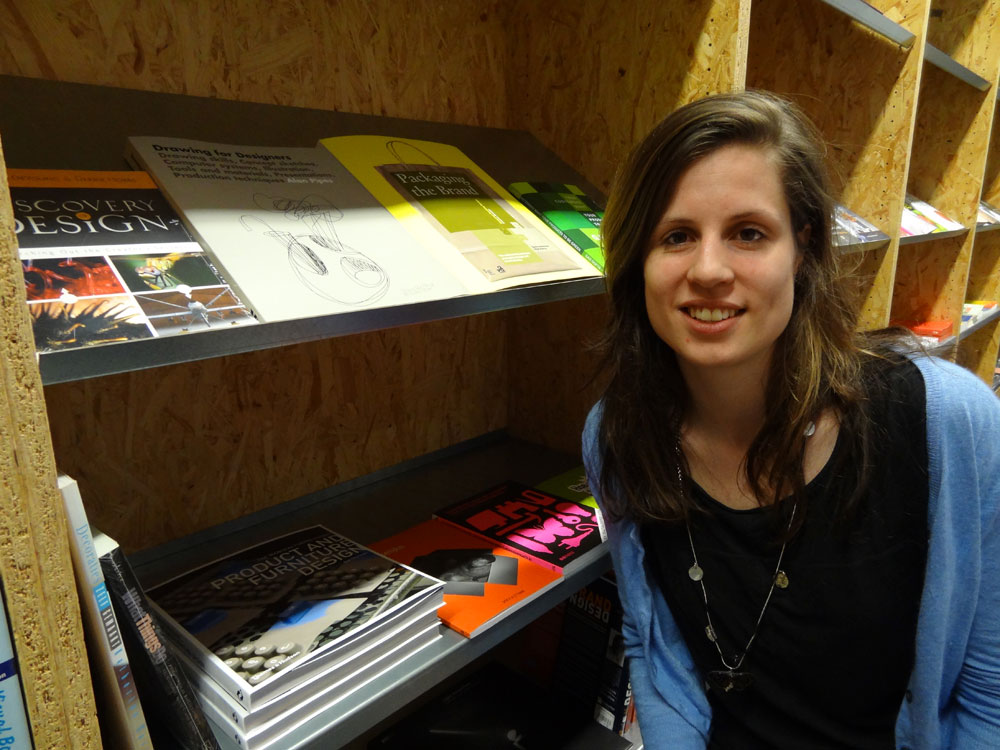Local bookshops are facing difficult times. In search of a new future, Heike Marin Faber (25) presented her MSc thesis on April 5 for the company Libris, for which she designed a new way of exploring books online: book browsing.
Libris is a cooperative of 100 entrepreneurs who own local bookshops, a purchase organization that buys large amounts of books in order to receive high discounts. Furthermore, Libris provides a web shop for book sales, but due to its low development budget and stiff competition from Bol.com, Libris’ web shop is struggling to compete on the market. The bookshop owners are having great difficulties dealing with the situation. Faber: “They do not have any knowledge about technology, internet and digital books. They’re a bit afraid of it, but at the same time they know that they have to do something with it.”
Faber therefore devised a solution for this problem in her ‘Integrated Product Design’ graduation project. Faber started her project with a preliminary research of possible improvements for local bookshops, connecting them with upcoming technology. She ended up with an idea to bring the experience of the ‘real’ bookshop to the internet: online ‘book browsing’.
The advantage of going to a bookshop is that you can ‘browse’ through a selection of books, looking at the front covers, reading the texts on the back, and asking for advice from bookshop staff. Internet shops, however, do not provide this experience: one can only search for titles and look up related books.
Faber resolved this problem by creating a whole new interface for the Libris web shop. When visiting the web shop, the user is presented with a selection of books, made by booksellers taking part in Libris. The book covers from the selection are displayed on the screen, and it’s possible to browse through the books by scrolling or swiping. By clicking on the book covers, more information becomes available.
With this solution Faber successfully brought the bookshop experience to the internet.
This conclusion was confirmed by testing the new website with users. Faber: “People really think it stands out from websites that are now available on the web, simply because the website is filled with book covers. It really attracts you.”
Libris has also embraced the results. “They said: It really is something for us,” Faber confirms. “This is the only way that we can give our knowledge to a website. It’s something that other web shops cannot do, as they do not have 400 booksellers.
De vierde plaats is een knap resultaat gezien het uit meer dan driehonderd ploegen bestaande algemeen klassement. De eindtijd van tien uur en 44 minuten exact zou in het apart opgemaakte universiteitsklassement goed zijn geweest voor een tweede plek achter het RuG Hanze Runnersworld Team uit Groningen. Aan de universiteitscompetitie deed overigens opnieuw geen officiële ploeg namens de TU Delft mee.
De snelste loper van Snot tijdens de 177 kilometer lange estafetteloop van Nijmegen naar de Twentse campus afgelopen weekend was Martin
Bloemendal. De civieltechnische promovendus liep de laatste (25ste) etappe in een gemiddelde snelheid van 19.05 kilometer per uur. Opmerkelijk omdat Bloemendal als enige al een (nacht)etappe achter de rug had, nota bene met 11,2 kilometer de langste. “Die liep hij met een snelheid van 17,6 kilometer per uur”, aldus aanvoerder Marco Janssen. “Niet bijzonder voor hem, maar Martin heeft er een handje van om een tweede etappe heel goed of zelfs harder te lopen. Vorige maand liep hij al een keer 19 kilometer per uur op een vijfkilometer, nu deed hij het in de snikkende hitte over 7.2 kilometer.” Wouter Hordijk en Jannis Topfer vielen op door beiden hun respectieve etappe te winnen. De laatste deed dat op een erg zwaar parkoers met een ruim drie kilometer lang heuvelachtig stuk door mul zand. Topfer versloeg daarin onder anderen de bekende, in Amsterdam studerende Nederlandse subtopper Michiel de Ruyter met bijna anderhalf minuut.
De eindtijd van Snot was ondanks de hitte iets sneller dan die van vorig jaar. “Vooraf hadden we natuurlijk gehoopt op een podiumplek”, aldus Janssen, “ook omdat we een sterker team hadden dan vorig jaar. Onze concurrenten hebben echter ook niet stilgezeten. Ik geloof dat de snelste ploeg, Appeltaart uit Breda, in totaal veertig minuten sneller liep dan de winnaars van vorig jaar, erg hard dus.”
Twee jaar geleden debuteerde Snot op de Batavierenrace. Het voor de derde keer winnen van het studentenklassement van de Hart van Brabantloop, acht maanden eerder, bracht hen op dat idee. Het team fungeerde feitelijk als alternatief voor de door perikelen met de toenmalige Delftse Studenten Sport Federatie (DSSF) ontbrekende officiële TU-ploeg in de universiteitscompetitie. De mix van snelste Delftse lopers en eigen clubleden haalde bij de eerste deelname zelfs de derde plaats, in een tijd van elf uur en negen minuten.



Comments are closed.